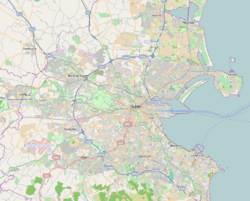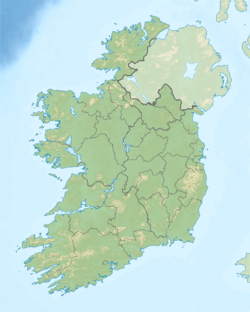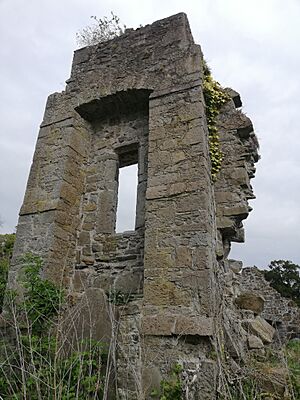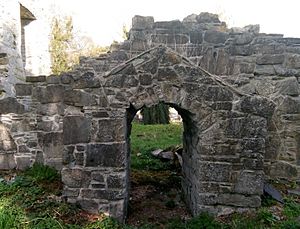Donaghcumper Church facts for kids
Quick facts for kids Donaghcumper Church |
|
|---|---|
| Old Donaghcumper Church; Donacomper, Donnacompare, Donnacompar, Dennycomfert, Downecumper, Donaghcomper, Donocomfert, Donocomper | |
|
Domhnach Compair
|
|
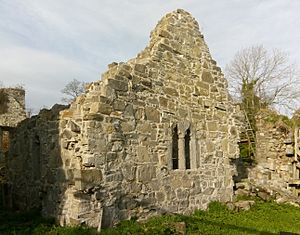
East end with ogee windows
|
|
| 53°20′23″N 6°31′41″W / 53.339782°N 6.527978°W | |
| Location | Donaghcumper, Celbridge, County Kildare |
| Country | Ireland |
| Denomination | Church of Ireland |
| Previous denomination | Pre-Reformation Catholic |
| History | |
| Founded | 12th century |
| Dedication | Saint Brigid |
| Architecture | |
| Functional status | ruined |
| Closed | 18th century |
| Specifications | |
| Materials | limestone, mortar |
| Administration | |
| Parish | Celbridge & Straffan with Newcastle Lyons |
| Diocese | Dublin and Glendalough |
| Province | Dublin and Cashel |
Donaghcumper Church is an old ruined church located in Celbridge, Ireland. It's a medieval church, meaning it was built a very long time ago. This historic site is officially listed with the code KD011-013.
Contents
Where is Donaghcumper Church?
Donaghcumper Church is found about 800 meters (or half a mile) east of Celbridge town. It's right on the R403 road, which is also known as the Dublin Road.
What is the History of Donaghcumper Church?
Early Beginnings of the Church
This site might have been used by Christians as early as the 5th century. The name Donaghcumper means "church of the confluence." A confluence is where two rivers or streams meet. The word Domhnach comes from a Latin word meaning "of the Lord." It's thought to be part of the names of Ireland's very first churches. A small stream called the River Shinkeen flows into the River Liffey about 550 meters north of Donaghcumper.
Building the Medieval Church
The oldest parts of the church were built around 1150–1160. This was around the time of the Norman invasion of Ireland, when Normans came to Ireland. In 1202, a family called de Hereford gave control of the church to St. Wolstan's Priory. Later, in the 14th century (around 1340), new stone windows were added to the church.
Changes Over Time
During the Reformation in Ireland, a big religious change, the church was no longer used in the same way. Its lands were taken over by John Alan, who was an important official called the Lord Chancellor of Ireland. He was buried at Donaghcumper in 1561. His nephew and grand-nephew were also buried there later.
Donaghcumper then became a Church of Ireland (a Protestant church) and was active for about 200 years. In 1690, a priest named James Warren worked there.
When Did the Church Become a Ruin?
A drawing from 1770 shows the church still had a roof and a tower. But by 1783, a map listed it as "Ch. Rs." which means "church ruins." An 1897 map also showed it as a ruin. Even though the church is ruined, the graveyard around it is still used. The oldest readable grave belongs to Nicholas Walsh, who died in 1711.
In 2000, some repairs were done to the church. In 2017, about €7,500 was given to help with more work on the site.
What Can You See at Donaghcumper Church Today?
Today, you can still see parts of the nave (the main part of the church) and the chancel (the area near the altar). The Alen family's burial vault is at the east end of the chancel. The east wall has a special window called an ogee window, which has a curved shape. The west wall has a belfry, which is where bells would have been.
Inside, a round arch separates the nave from the chancel. There's also a small porch with a roof on the south side. You can also see a piscina, which is a basin used for washing sacred vessels. Only one wall of the old tower remains. The church buildings are held up by temporary supports, and the area is fenced off to keep visitors safe.
 | Charles R. Drew |
 | Benjamin Banneker |
 | Jane C. Wright |
 | Roger Arliner Young |


